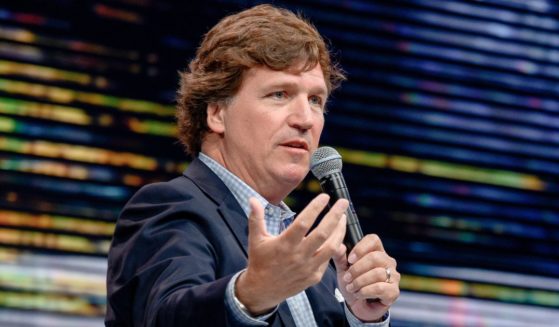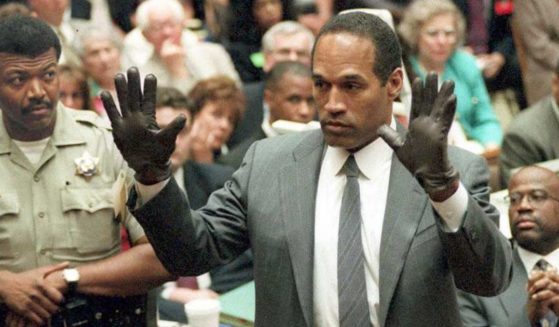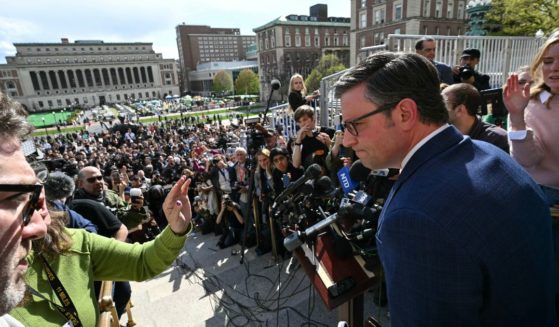Video: Liberals Now Say to 'Get Baby's Consent' Before Changing Diapers
How do you teach your children consent? The concept may seem pretty straightforward to us regressive right-wingers. At some point, you begin to impress upon them there are certain situations where they have the right and the responsibility to tell someone yes or no, and that in those situations it’s also crucial they listen to someone else’s yes or no and to accept that yes or no without exception.
Along with re-enforcement, it really should be that simple, right? Well, you conservative simpleton, you clearly aren’t up with the times. Why, I bet you didn’t even know you should be asking your child’s consent before changing their soiled diapers.
That silly idea first became popularized when “sexuality educator” Deanne Carson went on Australian TV and first floated the outré notion.
“‘I’m going to change your nappy now, is this OK?’” Carson declared parents should be asking their children. “Of course, the baby isn’t going to respond … but if you leave a space and wait for body language and wait to make eye contact then you’re letting that child know that their response matters.”
The quick spin was that Carson’s bizarre appearance was either a one-off or was misunderstood; Snopes even posted a page saying that the claim that “(s)exuality educator Deanne Carson said parents should ask a baby’s permission before changing their diaper” was “Mostly False” even though that’s exactly what she said. (I’m not even going to justify their torturous logic by reprinting or summarizing it here.)
So, clearly Carson was either a major outlier or she didn’t really say that, right? After all, Snopes said so, kind of. Nobody from the progressive left would ever back up such a notion. Except for another prominent liberal who went on “Tucker Carlson Tonight” and did just that.
Cathy Areu is the founder of Catalina Magazine, and she’s also made a number of dumbfounding appearances on Tucker’s show in the past as “The Liberal Sherpa.” Most of these, however, fell within the normal range of human opinions. This time, not so much.
Areu was invited onto Tucker’s show to talk about Carson’s remarks — which, as we know, were obviously misinterpreted and/or an outlier. Right?
While Areu admitted that “the baby isn’t exactly going to say yes or no,” she said that Carson’s basic idea — giving the child “a few moments” to give them an idea about the concept of consent and “what consent is” — was a pretty good parenting idea.
“It’s teaching bodily autonomy,” Areu said. “It’s teaching, ‘hey, I’m not going to touch your body if you don’t want me to. It’s just like talking to a baby about anything: ‘Mommy loves you.’ ‘Daddy loves you.’ So people talk to babies all the time.
“So why wouldn’t the concept of talking to a baby while doing something so serious as changing a diaper be so ridiculous? It sounds normal.”
Tucker then asked Areu what affirmative or negative consent would sound like in this situation, which is an exchange that needs to be seen to be believed and may not quite be believed even then.
So yeah, that happened. The best moment was when Tucker noted was that “maybe the child is crying because his diaper is dirty.”
“Right, obviously, yeah, so the parent would have to be the best judge of that,” Areu admitted. Which sounds like a pretty bad lesson when it comes to consent, especially if you’re “just teaching the baby to trust you.”
Tucker then asked if this applied to polio vaccines. If you thought Areu was going to backpedal here, uh-uh. She doubled down like Phil Hellmuth: “Yes, if you’re going to get a vaccine, I mean — dead people have to give consent. You can’t give organs if you don’t give consent, right?”
That’s right, deciding about organ donation when you’re an adult is exactly like deciding about getting the polio vaccination as a child. I know every parent should be able to explicate acquired immunity in such a way their 3-year-old can give informed consent. Easy as pie.
There’s one thing that I don’t think gets talked about enough here, particularly when it comes to this whole diaper-changing-consent phenomenon here (I think now that we’ve seen two quasi-experts say this is a good idea, we can at least say this isn’t just some lone crank we’re dealing with): Why is it that we’re teaching our children consent over the issue of changing diapers? Isn’t this actually one of the worst examples you can possibly use?
If you believe you cannot create a “culture of consent” with your child simply by talking to them about what the basic concept of consent entails and why it’s so important, there are a multitude of other ways you can do it. Do you want to wear this red shirt today? Do you want to go to the beach for your birthday? Do you want to buy this toy with your allowance? These are questions where they can easily and safely answer yes or no without serious risks to themselves or their body.
Some questions, especially for children, cannot come with that level of consent. We tell our children to eat their vegetables because letting them scarf down macaroni and cheese for every meal would be a horrible thing for a parent to do. When our progeny’s hand gets close to a hot stove, we don’t ask them whether or not they really want us to stop them from touching the burner.
Even if, in the end, we ended up making them eat the broccoli and smacked their hand away from the oven top anyway, asking them for consent in this situation is still terrible parenting of the highest (or, well, lowest) order. It teaches our children that every decision they make is a matter of consent; they have no responsibility to take care of themselves (or their families when they’re older) or to stay away from things that will cause them harm physically or emotionally. This is the dictionary definition of inculcating your child into unlimited permissiveness.
Tucker himself may have put it best: “What if the child keeps saying no over a period of weeks and you keep going in there, you’d really like to change the diaper, but the child refuses to give me consent? At some point, that becomes neglect, right? And also nasty.”
Wallowing in an undergarment filled with your own excrement is in no way a choice. Even if the baby obviously can’t say yes or no, it’s not something they should have agency over.
If you want to call this “bodily autonomy,” then so is burning yourself on the stove. So is your child deciding they don’t want to go to the doctor or get their vaccine shots. So is your child deciding they don’t want to get spanked as punishment, or get punished at all. So is your child deciding they don’t want to use their body to clean up their room. And so on and so forth, until you have an adult who’s internalized all of this and lives their life by it.
One hopes this kind of baneful witlessness is limited to Carson, Areu and a few eccentrics in their orbit. One fears — not just for sanity, but for the republic — that it isn’t.
Truth and Accuracy
We are committed to truth and accuracy in all of our journalism. Read our editorial standards.












